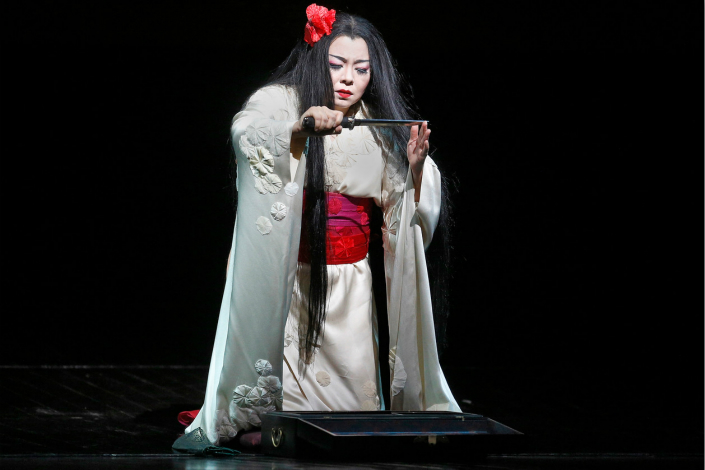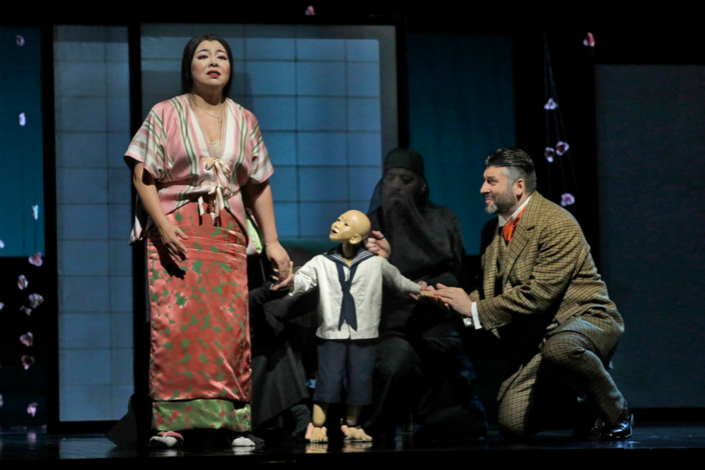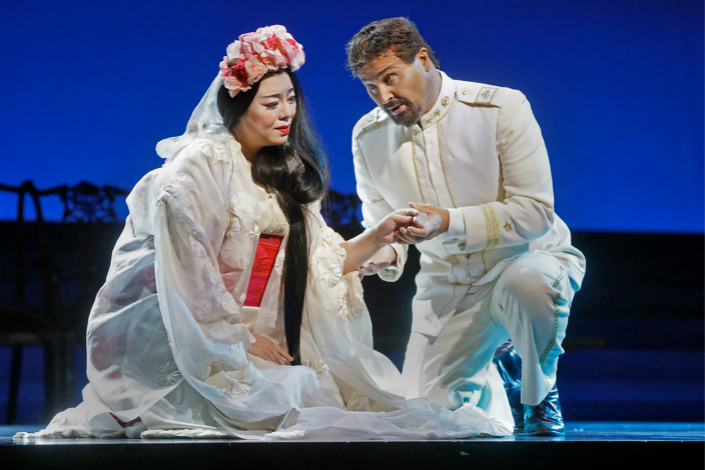Biography Hits High Notes of Chinese Soprano’s Career
Melanie Ho’s “Journey to the West” charts the career of He Hui, the Xi’an-born soprano who has become particularly well-known for her performances of the operas of Giuseppi Verdi and Giacomo Puccini.
He Hui was the first Chinese performer to sing Puccini's “Tosca” at Milan’s iconic La Scala theater, and the first to portray the titular character in Verdi's “Aida” at Vienna’s Staatsoper and New York’s Metropolitan; she has also become famous for taking on the lead role in Puccini’s “Madama Butterfly.”
Ho’s short work starts with the 18-year-old He’s chance introduction to the world of opera, when she was overheard singing by a high school teacher who simply happened to know a maestro, and quickly takes us through her formal training at the Xi’an Conservatory of Music, which she entered in the fall of 1990.
 |
Chinese soprano He Hui portrays Cio-Cio-San in a performance of the Giacomo Puccini's opera "Madama Butterfly" in New York City. The Xi'an-born He has become famous for her performance in the well-known opera. Photo: Ken Howard/Metropolitan Opera |
Unsurprisingly, one of the key themes that emerges in the book is that of He’s titular journey into the West and into a Western art form. One key thing He had to master in the months she spent preparing for her first Verona performance was the “italianità” needed to embody the role of an Italian diva and to impress local audiences, chiefly the Italian language and its diction:
“Walks along the streets of Verona, visits to the market, to the supermarket, to restaurants and cafés, her conversations with (opera agent) Benati and with others in the business all helped form her Italian.”
Unlike other non-Italians who wish to master opera today and take “specific classes in language and diction” and have the benefit of modern technology to prepare them for their arrival in Italy and to help them adjust when they are there, Ho particularly emphasizes that He’s experience was a lived, physical one.
 |
He Hui (left) and David Bizic play Cio-Cio-San and Sharpless respectively in a performance of "Madama Butterfly" at the Metroplitan Opera in New York City. Photo: Ken Howard/Metropolitan Opera |
He’s achievements of cultural understanding are somewhat undercut, though, by the fact that Ho does not really contrast them with any personal or professional struggles. Indeed, throughout the book, any of the few difficulties that are mentioned — a visa problem, years spent trying to break into opera after finishing her training, a father perplexed by her decision to sing rather than go into medicine — are quickly passed over so we can get to He’s next success.
The book is singularly focused on one aspect of He’s life — that of He Hui the singer. We are treated to fascinating deconstructions of both operas and specific lines, to illustrate how He studies her roles to understand both the character she is playing and the choices that are open to her own interpretation:
“When she stabs Scarpia with a dinner knife rather than submit to him in the finale of Act II and delivers one of the most famous lines in all opera, “Ecco il bacio di Tosca” (“This is Tosca’s kiss!”), she must not only convey dramatic verisimilitude but also her sense of the untranslatable Italian word “ecco,” which can mean anything from “here is” to “come and get it.”
 |
He Hui and Roberto Aronica are onstage as Cio-Cio-San and Pinkerton respectively during the opera "Madama Butterfly" in New York City. Photo: Ken Howard/Metropolitan Opera |
He’s personal life remains something of a mystery at the end of the book. We know she likes to return to Italy between tours, but what does she do when she’s there besides prepare for the next show? Does she share her time there with any close friends or family? Maybe the answer to these questions is “nothing” and “no,” but it still feels strange to come to the end of a biography and to have learned more historical information about the stages on which He has performed than about her childhood.
Of course, in such a brief snapshot of someone’s story, omissions like this are a necessity, and the book overall is engaging and passionate enough that even an opera philistine like me (I’ve only ever been to one once and I fell asleep) felt the need to listen to a Verdi opera after finishing the book, to see if I could appreciate what Ho and He clearly love.
Video credits: Hui He sings an excerpt from the title character’s Act II aria during the final dress rehearsal. (Production: Anthony Minghella. Conductor: Jader Bignamini. 2017–18 Season. Video Courtesy: Metropolitan Opera)
This article has been corrected, as it originally claimed Aida was written by Puccini and that Tosca was composed by Verdi. The opposite is true.
Contact reporter Joshua Dummer (dummer@caixin.com)







